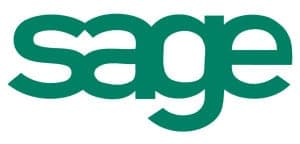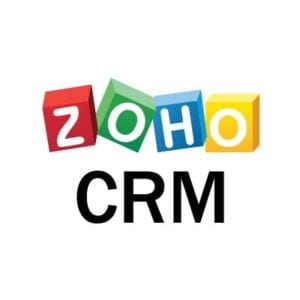
versus…

Clash of the Titans: Zoho CRM vs ACT!
Zoho CRM vs ACT: Do you need a full CRM or a simpler Contact Manager?
One of the first issues that small businesses run into when they start to grow is the problem of dealing with the increased data flow. This is especially apparent when dealing with multiple business apps and departments. One of the most damaging information overloads revolves around your customers.
Business gather customer information in many ways, and use it for product development, social media, sales, billing, and customer service. Making this kind of information available to the right people at all times can be challenging in our very diverse software environments. Your first order of business is to decide if you need a true Customer Relationship Management (CRM) suite or a simple Contact Manager program. Do you need Zoho CRM or ACT! by Sage? Let’s see how Zoho CRM vs ACT stack up…

Zoho’s CRM
Zoho CRM is a robust CRM module that can integrate with other platforms; it can also automate workflow. It provides full collaboration ability between multiple departments like accounting, sales, marketing, and customer service to ensure everyone has correct information. As a cloud service, you can access Zoho from anywhere with an internet connection. This gives Zoho users much more flexibility than they would have while tied to their desktop computer.
Zoho even has email marketing functionality to keep you in contact with your leads automatically. Zoho also provides unparalleled security features, including industry-leading data encryption, field-level security, and security profiles. Zoho’s Google Apps integration also enables even better productivity and access to information for integration and automation. ACT does not have the security parameters of Zoho. For that reason, we don’t recommend it for organizations with more than five users.
Zoho CRM may be a better fit if you need the following:
- Sales – billing and invoicing, mobile access, remote tracking, territory management, workflow rules and management.
- Marketing – email marketing, mailing list management, catalog integration of items.
- Help Desk – FAQ, forums, knowledge base, online self-serve, recorded demos.
- Customer Service – customer service integration and tracking, customization of user interface.
- Model and License – SaaS with monthly billing options – 3 user Free Edition – Professional & Enterprise Editions, the number of users that you can add is based on the user licenses purchased.
- Security – data encryption, field-level security, create roles and groups, and set up multiple administrative security profiles.
- Analytics – Executive dashboards, dashboard customization, forecasting and reporting.
- Extra Apps and Add-Ons – Google Apps, Zoho Apps, Microsoft Outlook integration, QuickBooks desktop integration, Zoho Books for light finance, and many other apps.

ACT! by Sage CRM
If you run a small business and need constant access to your customer data, ACT’s contact management attributes can save you money while keeping your team up-to-date. With internal memo templates and easy ways to communicate with all sorts of contacts, it makes things much quicker in general. Managers or administrators can pull reports on performance indicators and forecasts by their salespeople. This, in turn, gives them a better idea of the health of the company in genersal.
ACT also provides another feature not available in most other contact management software; the ability to help manage customer tickets or technical support cases with specific tracking options. This keeps all issues up-to-date and ensures better customer service with accurate tracking. ACT also integrates with Sage products and provides online access but is not as versatile as Zoho. It is also not well suited for mobile device use as is Zoho.
ACT! contact management may be a better fit if you need the following:
- Sales – no billing and invoicing – otherwise no obvious differentiation – same available features as Zoho as mentioned above.
- Marketing – referral tracking where Zoho does not.
- Support – has email and phone capabilities and request forms that Zoho does not.
- Model and User License – on premise (not SaaS) with monthly billing option – Windows and MS SQL based database (no for Zoho) – limited to 10 users.
- Extra Apps – QuickBooks and Sage 100 integration available.
Why move to Zoho in the cloud? There are two big reasons

Especially as the 21st century moves along, businesses that once used on-premise CRM solutions like Sage ACT find themselves looking for alternatives. The reasons for this, aside from those aforementioned, are the long-term scalability of a cloud-based solution, as well as security. The fact that Sage ACT is installed on-premise accounts for both of these reasons. Relying on a business’s own server to host a CRM and account for changes in users and login locations can (sometimes) render a system unstable. As well, cloud-based systems are inherently more secure than their on-premise brethren. They do this by providing an off-site entry point, which means business owners aren’t liable for data breaches, if they occur.
Zoho gives a big advantage with Zoho One

In the past couple of years, Zoho has significantly widened their advantage over other CRM apps by providing not only a family of integrated business apps, but offering all of them (over 40 in total) in one software suite called Zoho One. Zoho One, like all Zoho apps, is cloud-based, and features many integrations with the CRM. By using Zoho One, you could theoretically run your entire business – as opposed to just your CRM – from Zoho. This would give your staff and other users a more unified experience.
Ready for some more?
There are many more specific comparisons that can be made between Zoho CRM vs ACT, and these depend on your specific needs as a company, including CRM consulting, CRM training, or support plans. Contact us today and we’ll help you decide which of the two is right for your company.

